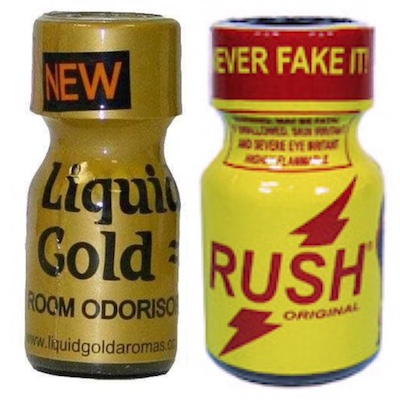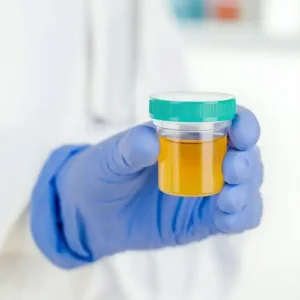Poppers are made from a set of chemicals called alkyl nitrites, examples of which are amyl nitrite, butyl nitrite, isobutyl nitrite and isopropyl nitrite. Poppers are normally supplied in small, plastic bottles as liquid chemicals.
The poppers ‘high’ is a result of the blood vessels becoming dilated, allowing more blood to get to the heart.
The key effects of poppers can include:
- A ‘high’ that can best be described as a sharp, quick head rush.
- Heightened sexual experiences.
- Chemical burns – normally of the face and nose – and/or a rash.
- Irritation of the throat and nose.
- Feelings of faintness and, possible, sickness.
- When used by those with heart problems they can prove fatal.
What do poppers look like?
The small bottles that poppers are supplied in usually have names such as TNT, Liquid Gold, Rock Hard, Thrust and Ram.
The name Poppers comes from the historic use of the chemicals to treat angina. In the past, the chemicals were originally used to reduce chest pain by increasing blood flow to the heart. The nitrites were supplied in small, glass capsules that would be “popped” open and sniffed.
When sold in sex shops, nightclubs or online they are often described as deodorisers or room aromas.
How are poppers used?
There are two popular methods of using the chemicals. The first – and most popular – method is to sniff the nitrites straight from the bottle. The second method involves inhaling the chemicals through a cigarette, which is dipped into the bottle.
The effects of poppers are almost instantaneous but they quickly fade after just a few minutes.
Because poppers are highly flammable, there have been cases where people have burnt themselves badly whilst using them around lit cigarettes.
What are the effects of poppers?
There are a number of effects associated with poppers:
- There is a distinctive head-rush that lasts for a few minutes.
- A variety of effects on sexual performance have been observed. Men often feel that the chemicals make an orgasm last longer or an erection seem harder. (Note: poppers have also caused men to be unable to gain an erection!)
- The sphincter muscles can become relaxed, making it easier to have anal sex.
- Poor coordination, sickness and a feeling of weakness are effects reported by users of poppers.
History of Poppers
Poppers were first discovered in 1844 by French chemist Antoine Jérôme Balard. He synthesised amyl nitrite while studying the chemical compositions of various solvents. By inhaling the fumes of amyl nitrite, he noticed its effects in dilating blood vessels.
In 1867, English physician Sir Thomas Lauder Brunton used amyl nitrite to treat angina. Angina is chest pain caused by reduced blood flow to the heart. Brunton found that amyl nitrite helped dilate blood vessels and increase blood flow. This quickly relieved the chest pain of his angina patients.
The glass capsules or “pearls” containing amyl nitrite were nicknamed “poppers” because they made a popping sound when crushed. For several decades, amyl nitrite pearls continued to be used for heart conditions like angina.
In the 1960s, amyl nitrite began to be used recreationally as a “club drug” and aphrodisiac. New alkyl nitrite formulas emerged, such as isobutyl nitrite and cyclohexyl nitrite. These avoided regulations on amyl nitrite while producing similar effects.
Poppers grew in popularity in the 1970s disco and club scene. Use was prevalent among gay men in particular. Some medical studies suggested poppers helped relax anal sphincter muscles and increased sexual pleasure.
Today, most poppers are isopropyl nitrite, isobutyl nitrite, or amyl nitrite. While illegal to sell for human consumption, they are often marketed as room deodorisers, leather cleaners, or nail polish removers.
Health Effects
Inhaling poppers does not typically lead to addiction. However, there are short-term effects and risks to consider:
- Head rush – Users report feeling euphoric, warm, dizzy, or disoriented for 1-2 minutes after inhalation. Some also feel heightened sensory perception.
- Drop in blood pressure – Poppers enlarge blood vessels, causing a temporary drop in blood pressure. This can lead to rapid or irregular heart rhythms.
- Reduced blood oxygen – Widened blood vessels and lowered blood pressure reduces oxygen supplied to the brain and body. This can result in unconsciousness, coma, or death.
- Chemical burns – Spilled poppers can burn skin, eyes, and other mucous membranes. Burns around the nose and mouth are common from direct inhalation.
- Vision problems – Use is linked to temporary or permanent changes in vision, like blurriness or spots. A condition called “poppers maculopathy” can damage the retina.
- Erectile dysfunction – Some men report losing their erection after using poppers. The chemicals restrict blood vessels after the initial dilation, preventing proper blood flow needed for an erection.
- Immune suppression – Frequent use may impact the immune system, making users more vulnerable to infections. Those with HIV/AIDS could be at higher risk of health complications.
- Increased stroke risk – The stroke risk rises 4-fold in the first 24 hours after inhaling poppers. This risk is greater for those with existing heart or blood pressure problems.
What risks are associated with poppers?
For those that suffer from heart problems, anaemia or glaucoma, taking poppers can be very dangerous. Some of the risks include:
- Your blood pressure can drop to dangerously low levels. If you are taking Viagra or any sort of medication for low blood pressure, you should not use poppers.
- Reduced oxygen supply to vital organs can cause death. Using poppers at the same time as alcohol can increase this risk.
- You can lose consciousness and may die from choking on your own vomit.
- Because they are highly flammable, you run the risk of burns when using them. They can also burn your skin and could even kill you if you inadvertently swallow them!
- Cases of ‘sudden sniffing death syndrome’ have been reported, caused by abnormal rhythms of the heart.
- Temporary or permanent loss of vision can also be caused when sniffing the chemicals. ‘Poppers Maculopathy’ is a recognised concern and anybody who has suffered vision problems after using poppers is advised to consult their GP in the first instance.
- Alcohol and poppers are not a good combination. Together they will diminish the supply of oxygen to vital organs, often causing unconsciousness, sometimes-even death.
The law and poppers
- Amyl Nitrate is controlled substance under the Medicines Act of 1968. Some shops have been prosecuted under this legislation for selling poppers. However, the Misuse of Drugs Act 1971 does not control poppers.
- Supplying poppers to another is an offence, although personal use or possession is not illegal.
Photo by DEA
Zoom Testing is a leading UK drug testing company and a supplier of Drug Test Kits.





